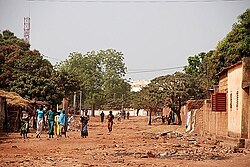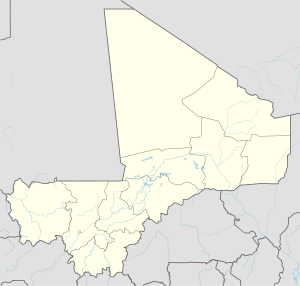Bougouni is a commune and city in Mali, the administrative center of Bougouni Cercle, which is in turn found in the administrative region of Sikasso. Bougouni is located 170 km south of Bamako and 210 km west of the city of Sikasso. It covers an area of 7 square kilometres and as at the 2009 Census the commune had a population of 59,679,[1] mostly Fulas (Fula: Fulɓe; French: Peuls) and Bambaras (Bambara: Bamananw).
Bougouni | |
|---|---|
Commune and city | |
 Bougouni, near the bus station | |
| Coordinates: 11°25′0″N 7°29′0″W / 11.41667°N 7.48333°W | |
| Country | |
| Region | Sikasso |
| Cercle | Bougouni Cercle |
| Elevation | 344 m (1,129 ft) |
| Population (2009) | |
| • Total | 59,679 |
| Time zone | UTC+0 (GMT) |

History
editBougouni was established as a quarantine area for surrounding villages, but gradually developed independently. The name means 'small house' in Bambara.[2]
Bougouni was the fourteenth commune created by the French colonial authorities of French Sudan. On July 10, 1894, Bougouni became the administrative center of the commune under its first administrator, Lieutenant Gouraud. Bougouni held an important set of colonial archives which were lost in a fire during the March 1991 uprising against President Moussa Traoré.[2]
Geography
editBougouni, like many cities of Mali, enjoys sufficient rainfall for regular farming. Cotton is produced in the region around the town, making it a center for processing and transport. The Bougouni-Foulaboula Protected Forest (Forêt Classée de Bougouni-Foulaboula) begins just to the southwest of the town.
Bougouni has been a sister city of Aurillac, France, since 1985.
The Cercle of Bougouni includes the communes of Bladié-Tiemela, Bougouni, Chantoula, Danou, Debelin, Defina, Dogo, Domba, Faradielé, Faragouaran, Garolo, Keleya, Kokelé, Kola, Koumantou, Kouroulamini, Meridiela, Ouroun, Sanso, Sibirila, Sido, Tiémala-Banimonotié, Wola, Yinindougou, Yiridougou and Zantiebougou, for a total population of 251,987.
Climate
editBougouni has a tropical savanna climate (Köppen climate classification: Aw).
| Climate data for Bougouni (1991-2020) | |||||||||||||
|---|---|---|---|---|---|---|---|---|---|---|---|---|---|
| Month | Jan | Feb | Mar | Apr | May | Jun | Jul | Aug | Sep | Oct | Nov | Dec | Year |
| Mean daily maximum °C (°F) | 34.2 (93.6) |
37.1 (98.8) |
39.0 (102.2) |
38.9 (102.0) |
37.0 (98.6) |
34.0 (93.2) |
31.4 (88.5) |
31.0 (87.8) |
31.6 (88.9) |
33.7 (92.7) |
35.5 (95.9) |
34.5 (94.1) |
34.8 (94.7) |
| Daily mean °C (°F) | 25.6 (78.1) |
28.6 (83.5) |
31.3 (88.3) |
32.2 (90.0) |
30.9 (87.6) |
28.6 (83.5) |
26.8 (80.2) |
26.4 (79.5) |
26.8 (80.2) |
27.9 (82.2) |
27.4 (81.3) |
25.5 (77.9) |
28.2 (82.8) |
| Mean daily minimum °C (°F) | 17.1 (62.8) |
20.0 (68.0) |
23.5 (74.3) |
25.5 (77.9) |
24.8 (76.6) |
23.2 (73.8) |
22.2 (72.0) |
22.1 (71.8) |
21.9 (71.4) |
22.1 (71.8) |
19.1 (66.4) |
16.5 (61.7) |
21.5 (70.7) |
| Average precipitation mm (inches) | 1.5 (0.06) |
1.2 (0.05) |
7.2 (0.28) |
36.0 (1.42) |
103.5 (4.07) |
160.0 (6.30) |
263.9 (10.39) |
292.7 (11.52) |
221.2 (8.71) |
73.8 (2.91) |
5.3 (0.21) |
0.0 (0.0) |
1,166.3 (45.92) |
| Average precipitation days (≥ 1.0 mm) | 0.4 | 0.5 | 1.4 | 4.5 | 9.3 | 12.7 | 17.6 | 20.1 | 17.7 | 8.8 | 0.9 | 0.0 | 93.9 |
| Mean daily sunshine hours | 8.8 | 8.7 | 8.1 | 7.8 | 8.1 | 7.9 | 6.8 | 6.3 | 7.1 | 8.1 | 8.6 | 8.4 | 7.9 |
| Source 1: NOAA[3] | |||||||||||||
| Source 2: Deutscher Wetterdienst (daily sun)[4] | |||||||||||||
See also
editReferences
edit- ^ "Previsions de desserte des communes pour la periode de 2001-2005" (PDF). Mali Reforme Telecom. Archived from the original (PDF) on August 29, 2004. Retrieved February 12, 2009.
- ^ a b "Bougouni, ma ville natale !". Afribone. Retrieved 9 October 2024.
- ^ "World Meteorological Organization Climate Normals for 1991-2020: Bougouni" (CSV). NOAA. Retrieved 7 January 2024.
- ^ "Climate Averages for Bougouni" (PDF) (in German). DWD. Retrieved 7 September 2022.
- Bougouni, Mali, Falling Rain.
- Cheich Abd El Kader Bougouni, ma ville natale ! Archived 2011-05-27 at the Wayback Machine, 1999-2008 - Afribone Mali SA.
- "Mother and Child [Mali, Bougouni or Dioila area; Bamana peoples (1979.206.121)". In Timeline of Art History. New York: The Metropolitan Museum of Art, 2000–. (October 2006).
- Bougouni Mosque: ArchNet listing.
- Geographic features & Photographs around Forêt Classée de Bougouni-Foulaboula, in Mali.
- Bougouni Village Raw Cotton, Alibaba.com company profile.
- Bougouni Cercle listings[permanent dead link], African Development Information Services database.
- Action Santé et Education pour Bougouni - ASEB, Bougouni based health services cooperative/ngo, 2006.
- 1957 area map of Bougouni Cercle, US Army.
